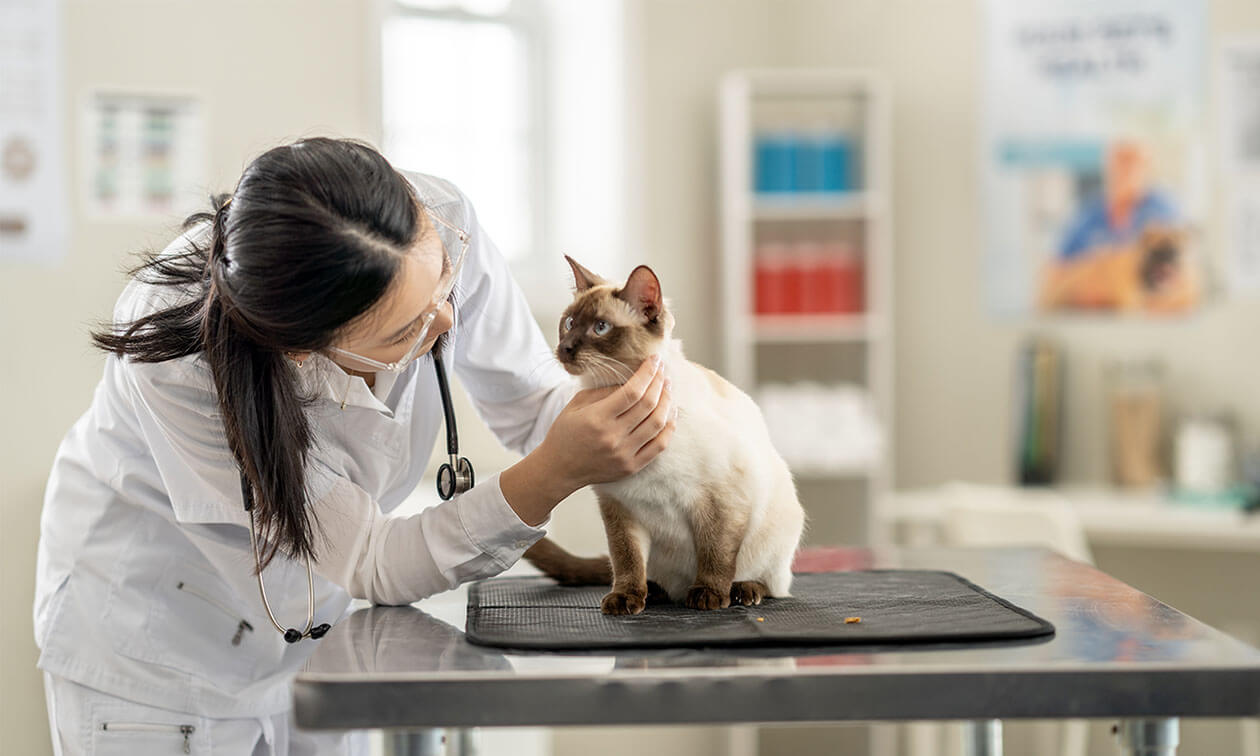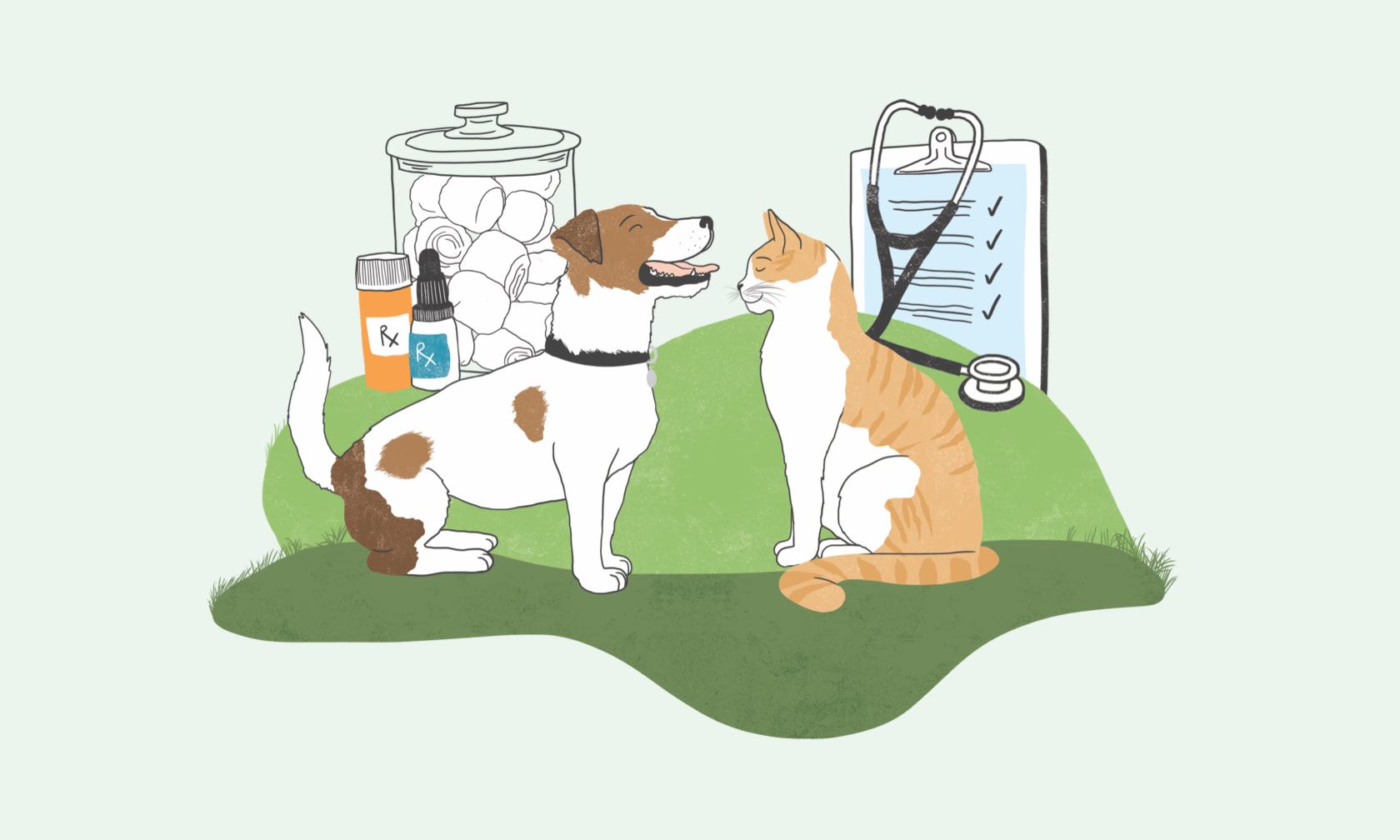The saying "it takes a village" is particularly true when it comes to the health of our pets. A veterinary hospital or clinic needs a committed group of individuals in front of and behind the scenes for it to function in the most efficient, safe, and caring manner. This is your veterinary healthcare team at work. Each person plays a critical part in your pet's healthcare journey.
While each clinic is slightly different, the core people involved in your pet's care generally include veterinarians, veterinary technicians, veterinary assistants, receptionists, office managers, and kennel technicians. Knowing each person's role in the practice helps you better understand the inner workings of the veterinary hospital and how your pet is being cared for.
Veterinarians
Your pet's doctor is the veterinarian — a highly trained individual who protects both animal and human health. To become a veterinarian, they must complete four years of undergraduate school and four years of veterinary school. To practice, they must pass national board exams, and meet requirements for licensing in the state(s) in which they practice. Board-certified veterinary specialists, such as ophthalmologists and neurologists, receive an additional three to four years of training and must pass an additional examination to be certified in their specialty.
Only a veterinarian is qualified to perform many aspects of patient care, including comprehensive physical exams, the diagnosis and treatment of medical conditions, general preventive care, prescribing medication, and surgical procedures.
Not all aspects of your pet's health can be determined from their history. This is when a veterinarian puts their education and training to work with a physical exam to evaluate your pet. They also perform and interpret diagnostic tests to help confirm their diagnosis and develop a treatment plan.
Veterinary Technicians
A veterinary technician is trained through an American Veterinary Medical Association-accredited program and must pass an exam to be licensed or credentialed. They are a key member of the veterinary team, performing both medical and non-medical services, including:
- Assisting with exams and surgical procedures
- Administering and monitoring anesthesia
- Performing laboratory procedures and diagnostic tests
- Collecting samples, such as urine, feces, and blood
- Intravenous catheter placement
- Providing nursing care to pets
- Administering first-aid
- Preparing pets for surgery
- Medicating and vaccinating pets
- Taking medical histories
- Educating pet owners
As you can see, a veterinary technician is the backbone of a veterinary care team.
Veterinary Assistants
Veterinary assistants are another essential aspect of the veterinary team. While they are not licensed, they are well-educated and crossed-trained in several different areas of the hospital. Some have completed veterinary assistant training programs, while others received on-the-job training. They assist both veterinarians and veterinary technicians. They also perform many tasks throughout the practice to help meet client needs. Some duties of a veterinary assistant include:
- Assisting with pet handling during exams and procedures
- Providing care to hospitalized patients
- Feeding and walking pets who are staying in the hospital
- Helping perform diagnostic tests
- Collecting samples for testing
- Cleaning and disinfecting the hospital
- Assisting with kennel duties
- Helping with clerical work
- Assisting clients
A veterinary assistant's diverse training and multi-tasking ability help to provide pets and people with a positive experience.
Receptionist
Generally, the first point of contact you have with a veterinary hospital is with the receptionist. But they do considerably more than greet clients and their pets at the door. They are responsible for:
- Managing multiple phone lines
- Scheduling, confirming, and checking in appointments
- Updating client and pet information
- Assessing basic pet health status to determine the urgency of care
- Explaining hospital services and policies
- Updating clients on the status of their pets
- Educating clients
- Admitting and discharging pets
- Managing communication between clients and different members of the veterinary care team
- Helping in critical emergencies
- Client counseling
A receptionist is constantly on-the-go and working to provide the best possible customer service experience.
Office/Practice Manager
The main responsibility of a manager is to help the hospital function efficiently by managing the veterinary healthcare team and various aspects of the business. Some of their duties include:
- Hiring, training, educating, and supervising staff
- Handling clinic financials
- Managing inventory
- Establishing business standards and protocols
Managers generally have little involvement in pet care. Still, they are essential in helping pet owners by answering questions, explaining policies, dealing with payment issues, and keeping things running smoothly.
Kennel Technicians
Last, but certainly not least in the veterinary health care team, is the kennel technician. Their duties predominately center around pet care and safety as well as maintenance of a sanitary environment.
The kennel technician ensures that pets are properly fed, have adequate water, and exercise. In some cases, they will also administer medications. They closely observe pets for any health issues or changes in behavior while staying at the hospital. Their observations are documented and communicated to the veterinarian to address any issues.
Kennel technicians must routinely clean and disinfect the entire kennel area to prevent the spread of disease. Part of their cleaning responsibility includes maintaining the cleanliness of each pet's personal items, like blankets and beds.
Many veterinary hospitals offer grooming and bathing services. Kennel technicians can also assist with these tasks since the pets in their care are often comfortable with them. The technician usually arrives before the clinic opens, so pets are bathed and dry when owners arrive to pick them up after overnight visits.
This is the village that makes up your pet's veterinary healthcare team — a well-trained, committed group of people dedicated to improving your dog or cat's quality of life.
ZPC-02407R1



